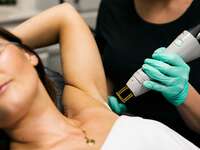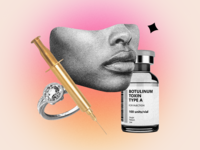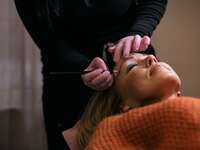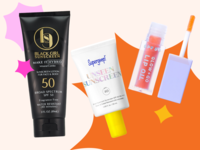A Guide to Getting Botox Before Your Wedding
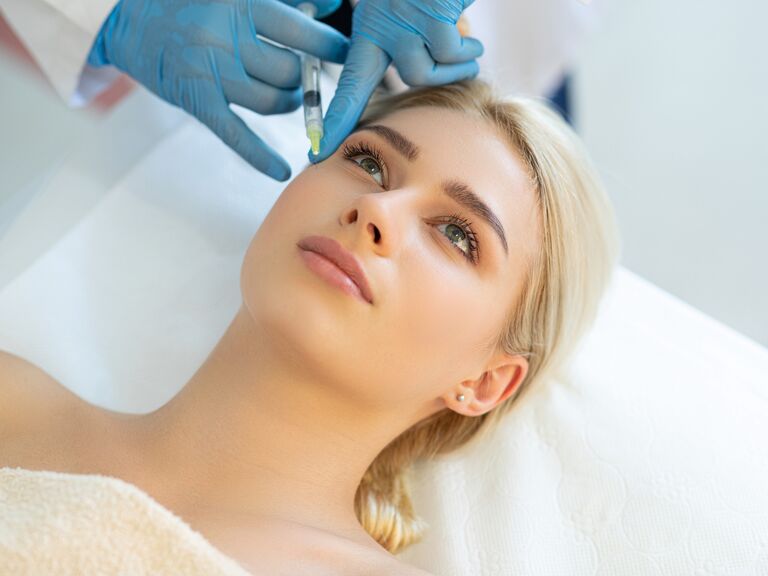
In-office visits and elective cosmetic procedures are baaack, and that means one thing: You're free to inject, peel, laser and otherwise professionally refresh your skin before your big day like it's 2019 again. One of the most popular pre-wedding skincare treatments is Botox, an injectable neuromodulator (also called a neurotoxin) that corrects and prevents fine lines and wrinkles. While Botox injections are certainly popular, there's a lot you may not know about this injectable. Whether you're planning to get Botox for the first time or you're weighing the pros and cons before making your pre-wedding skincare hit list, the concept of cosmetic injections can be daunting. The good news? We've got the deets you should know before you go under the needle. Below, a breakdown of what Botox is, how it works, when to factor it into your wedding planning and how much it costs—plus expert tips to make the most of your Botox treatment.
Editor's note: Before you make any major decisions regarding your pre-wedding skincare routine, make an appointment with a dermatologist or plastic surgeon you trust a year to nine months before your wedding date. A medical professional will help determine which cosmetic treatments (if any) are right for your specific needs. If you're considering going to a medical spa (sometimes called a med spa) for Botox or other injectables, do you research first, and be wary of super-low prices. The side effects of improperly injected Botox can be painful and in some cases, dangerous. Make sure you're working with a board certified injector you trust.
How Botox Works
A neuromodulator is any substance that interferes with the transmission of signals between neurons. In dermatology, neuromodulators are primarily made of Botulinum toxin type A, a neurotoxin that relaxes facial muscles and smooths out dynamic wrinkles. You might know some of the most popular ones by their brand names: Botox, Dysport, Jeuveau and Xeomin. "Regarding dermatology, we use neuromodulators like Botox in order to inhibit nerve transmission," says Marnie Nussbaum, MD, a board certified dermatologist in New York City. "They bind to the presynaptic nerve in the muscle and block a neurotransmitter called acetylcholine, which is responsible for contraction of the muscles. Therefore, they significantly minimize dynamic movement of facial muscles and minimize fine lines. " Translation: These injectables prevent wrinkle-causing muscles from tensing up, minimizing and smoothing out fine lines like crow's feet, frown lines, the "elevens" between the eyes or other deep wrinkles.
The Difference Between Botox and Filler
It's also important to note that Botox is not the same as filler (also called dermal filler). While they are both injectables, Botox is a neurotoxin that works to relax facial muscles and smooth out fine lines. Fillers are gel-like substances that are injected beneath the skin to restore lost volume, smooth lines and soften creases or enhance facial contours. Many of the most popular fillers are made with hyaluronic acid, but they can also be made of other substances like Poly-L-lactic Acid or Calcium Hydroxylapatite. Some of the most popular fillers are known by the brand names Restylane, Juvederm, Bellafill and Sculptra.



How do they work? It varies depending on the type, but generally filler sits under the skin to plump up areas that have lost volume or elasticity over time. As proteins in the skin like collagen break down with age and cause hollow areas in the face or droopy skin, filler can help to reverse or lessen the effects. "Filler works to volumize or lift certain areas of the face." Nussbaum says. "Filler can lift the cheekbones, fill in the nasolabial folds, volumize the lower face and give lips an enhanced pout."
How To Time Botox Before Your Wedding Day
Neuromodulators take anywhere from three days to a week to set in, so you won't see full results instantly. They also last for three to four months, so you want to make sure you work with a pro to schedule your treatment correctly and with plenty of time to make any adjustments. If you get Botox too far in advance of your wedding day, it might wear off, but too close to your day and the Botox may not have enough time to take full effect, or you might have noticeable bruising and puffiness at the injection site.
Nussbaum suggests testing out neuromodulators six months before your wedding to make sure you like the results and have enough time to make any necessary tweaks or adjustments. "I always tell every bride or groom to try a neuromodulator six months prior to their wedding date to make sure they like the results," Nussbaum says. "Then, we replicate the treatment approximately four weeks prior to the wedding." Nussbaum also recommends scheduling a touch-up one to two weeks after the injection, so the results are perfect on your wedding day—and of course for your wedding photos.
The Benefits of Getting Botox Before Your Wedding Day
Real talk: Not everyone needs to get Botox before their wedding day. The pressures to look perfect thanks to the myriad of filters on social media can be devastating. Let us say it again: Cosmetic injectables are certainly not for everyone, and a solid arsenal of skincare products plus a skilled makeup artist can work wonders—no needles necessary. However, if a board certified dermatologist or plastic surgeon recommends it, there are some benefits to getting Botox before your wedding day. Good candidates for Botox include: those who are in good physical health, are not pregnant or nursing, and have moderate to severe dynamic wrinkles like crow's feet, frown lines, wrinkles between the brows (also called "elevens") and forehead creases. Say you've tried every fancy serum, night cream and LED light mask on the market and you're still bothered by the appearance of fine lines and wrinkles, Botox could be a more effective approach. Though it does involves injections, Botox is also a relatively affordable and non-invasive way to address the aging process and look more youthful and refreshed on your wedding day.
How Much Botox Costs
The cost of Botox can vary depending on which type of substance (or brand) is used, the areas injected, how many units are used and the expertise level of the injector. It usually ranges from $400 to $1200.
Other Tips for Getting Botox Before Your Wedding Day
Below, find pre and post-treatment tips endorsed by the experts.
- Talk to your physician about medications and supplements you may be taking. Over the counter medicines and supplements like aspirin, ibuprofen, and St. John's Wort should be discontinued at least four days before Botox treatment.
- Avoid drinking alcohol 24 hours before getting Botox. This helps prevent redness and bruising.
- Don't use a chemical peel or get a facial in the days leading up to your Botox treatment.
- To reduce bruising at the injection site, you can apply arnica topically and ice your face periodically before and after the treatment.
- Most people can resume normal daily activities after Botox. However, if it's your first treatment you might want to plan to have some downtime where you can relax.
- You won't be able to exercise until at least four hours after your treatment, so consider getting a quick workout in before you head to our office for your Botox treatment.
- Don't get a facial or head massage for a full 24 hours after Botox. You should also avoid rubbing the injection site or sites.
- Don't lie down for at least three hours after receiving Botox, and try not to sleep on your face the night after receiving your treatment.
Please note: The Knot and the materials and information it contains are not intended to, and do not constitute, medical advice and should not be used as such. You should always consult with a medical professional about your specific circumstances.





